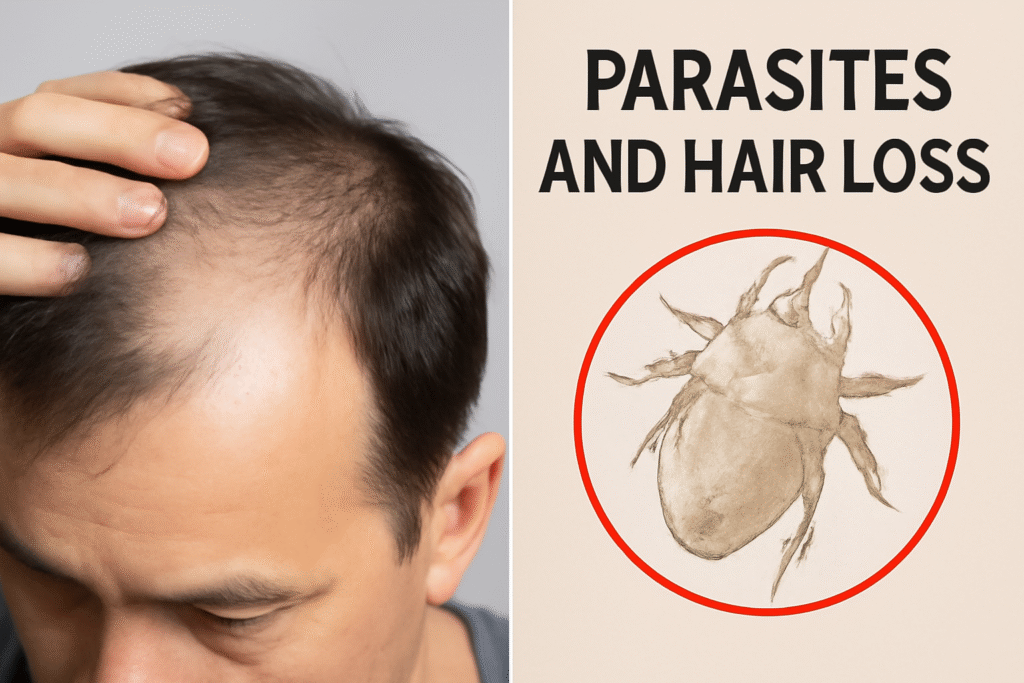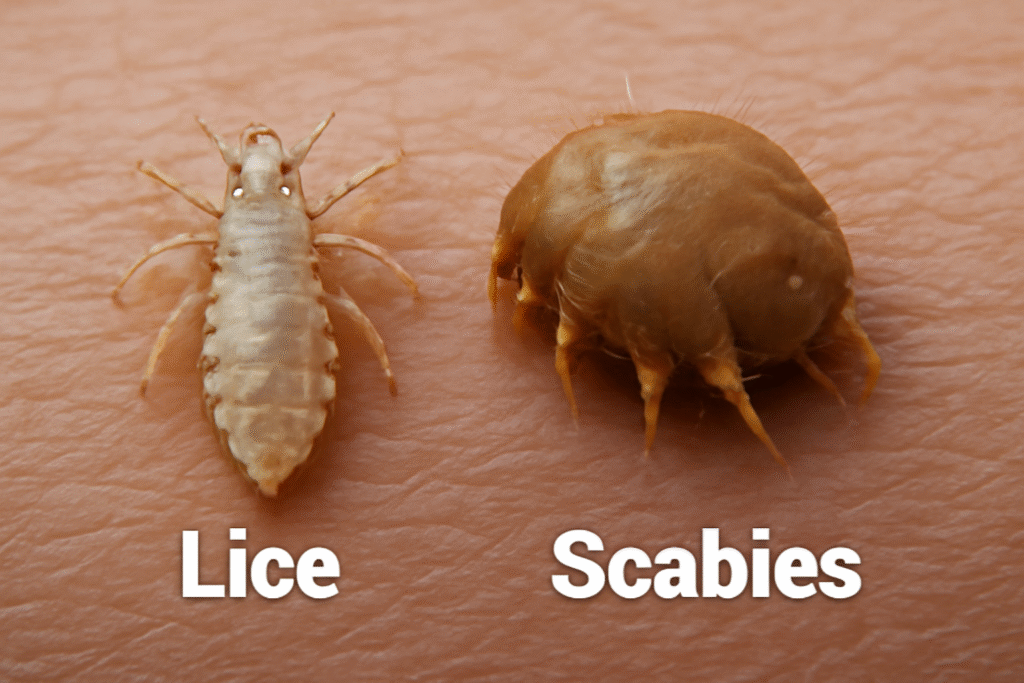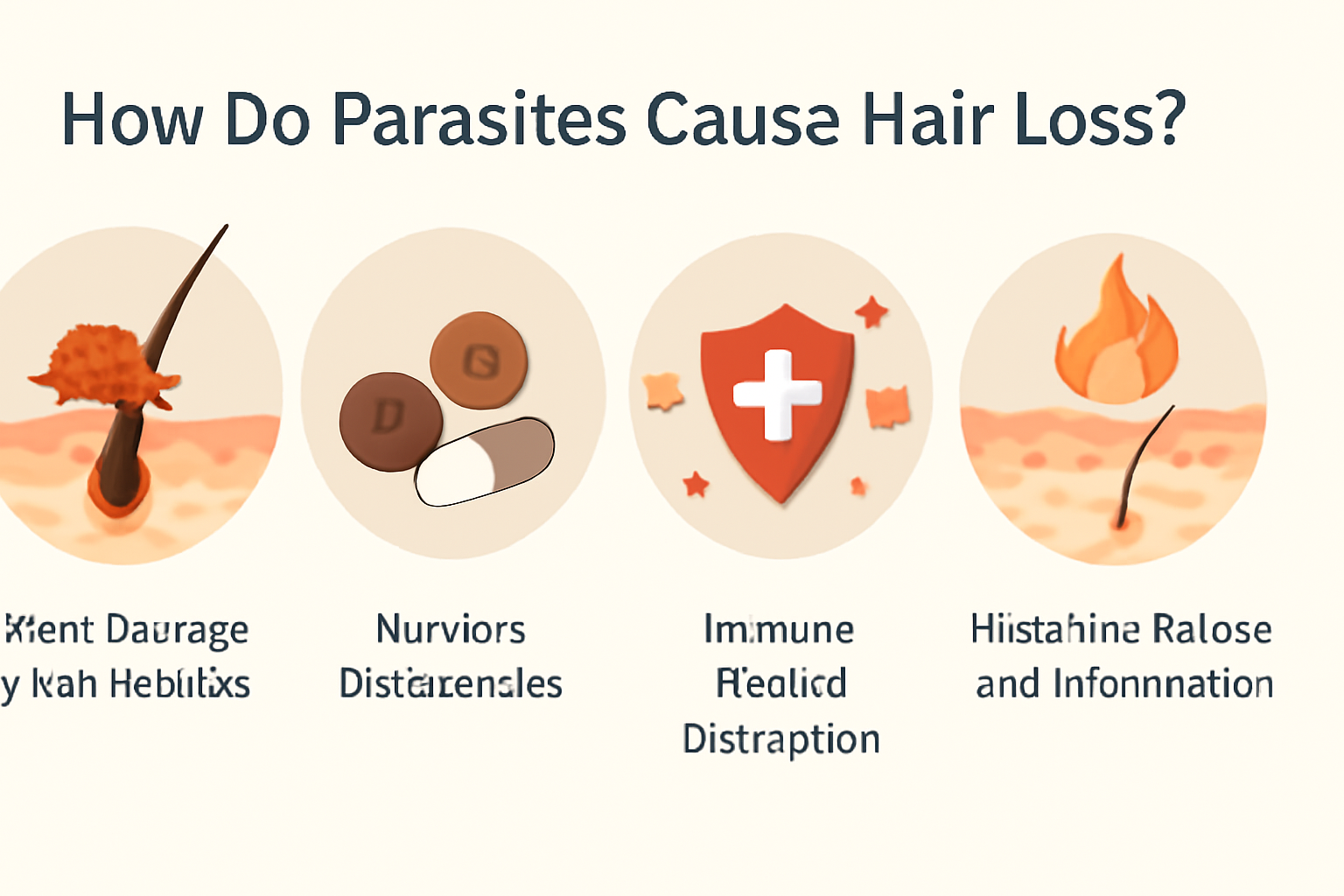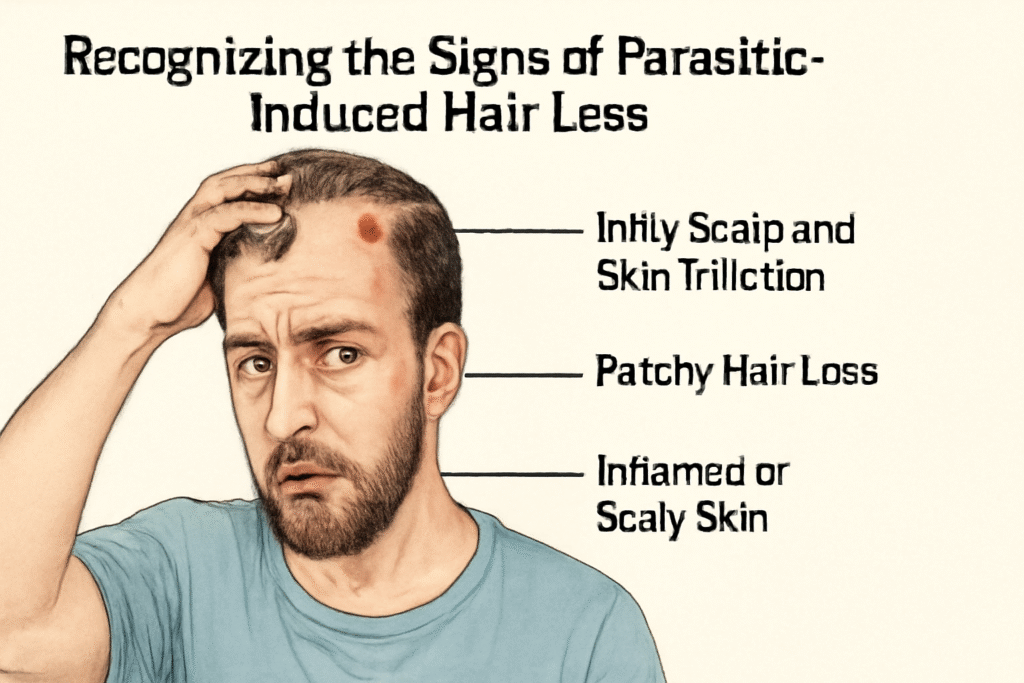Experiencing hair loss can be incredibly distressing, and often, the cause remains a mystery. One potential and often overlooked factor contributing to hair loss is parasitic infections. Parasites, such as scalp mites, lice, and internal worms, can wreak havoc on your hair and scalp, leading to thinning and shedding. In this article, we'll explore how …
Experiencing hair loss can be incredibly distressing, and often, the cause remains a mystery. One potential and often overlooked factor contributing to hair loss is parasitic infections. Parasites, such as scalp mites, lice, and internal worms, can wreak havoc on your hair and scalp, leading to thinning and shedding.
In this article, we’ll explore how parasites contribute to hair loss, the signs to watch for, and the treatments available. Understanding this connection can help you restore your hair health and regain your confidence.

What Are the Main Parasites Linked to Hair Loss?
Parasites come in various forms, and several of them are capable of inflicting damage to your hair follicles and scalp. While the connection between parasites and hair loss might not be immediately obvious, it’s important to identify which types of parasites could be causing your hair loss.
Demodex Mites
Demodex mites are microscopic creatures that live in the hair follicles of humans. Everyone has these mites on their skin, but an overgrowth can cause damage to hair follicles, leading to hair thinning or even hair loss.
These mites thrive in an environment with excessive oil production, making them more common in people with oily skin or those suffering from certain skin conditions like rosacea.
Prolonged infestation by Demodex mites can result in a condition called demodicosis, which can lead to inflammation and hair loss. Symptoms include itching, redness, and even small pustules or bumps around the hair follicles.
Ringworm (Tinea Capitis)
Ringworm is a fungal infection caused by dermatophytes, commonly affecting the scalp and leading to hair loss. This condition is highly contagious and can spread through direct contact with an infected person or contaminated surfaces. Ringworm typically results in scaly, red patches on the scalp, which can cause hair to break off in those areas, leading to noticeable bald patches.
Tinea capitis, a form of ringworm, is particularly prevalent in children, but adults can also be affected. It is treated with antifungal medications prescribed by a doctor.
Lice and Scabies

Lice and scabies are common parasitic infections that can lead to hair loss. Lice are tiny insects that feed on blood and cause intense itching. They infest the scalp and hair, causing inflammation and discomfort. In severe cases, scratching the scalp excessively can damage the hair follicles and cause hair loss.
Scabies, caused by microscopic mites, also leads to intense itching and can result in hair loss if the scalp becomes severely irritated.
Gut Parasites
Though they might not directly affect the scalp, gut parasites such as Giardia and hookworms can impact hair health. These parasites disrupt the gut’s ability to absorb essential nutrients, leading to deficiencies in vitamins and minerals that are critical for healthy hair growth. Iron, zinc, and biotin are essential for hair health, and when their levels drop, hair may become weak and prone to shedding.
Folliculitis
Folliculitis, which is inflammation of the hair follicles often caused by bacteria, fungi, or parasites, can also lead to hair loss. This condition can cause small, pus-filled bumps around the hair follicles, which if left untreated, can result in permanent hair damage and scarring, leading to hair loss.
How Do Parasites Cause Hair Loss?

Parasites can cause hair loss in a variety of ways. The direct damage they inflict on the scalp, along with their effects on the body’s overall health, contribute to the gradual thinning and shedding of hair.
Direct Damage to Hair Follicles
Parasites like Demodex mites, ringworm, and lice directly damage the hair follicles. The inflammation and irritation they cause can weaken the hair follicles, making it difficult for hair to grow or causing hair to fall out prematurely.
For example, ringworm can cause the hair to break off near the scalp, leading to visible bald spots. Similarly, lice infestations can lead to excessive scratching, which may damage the hair shafts and result in hair breakage.
Nutrient Deficiencies (Iron, Zinc)
Certain gut parasites lead to nutrient deficiencies by interfering with the absorption of vital nutrients. Giardia and hookworms, for example, can lead to deficiencies in nutrients like iron, zinc, and vitamin B12, all of which are crucial for healthy hair growth. When your body lacks these nutrients, hair follicles become weak, and hair loss becomes more pronounced.
Immune System Disruption
The immune system’s response to parasitic infections can cause hair loss. As the body works to combat the parasites, it may direct more energy toward fighting the infection, which can hinder the body’s ability to nourish the hair follicles. This can result in temporary hair loss.
Histamine Release and Inflammation
When parasites invade the body, they often trigger the release of histamine, which leads to inflammation. Chronic inflammation in the scalp can disrupt the hair growth cycle, leading to hair thinning or shedding. This is especially common with Demodex mites and scabies, where the immune system reacts to the parasites by producing histamine, exacerbating the hair loss.
Recognizing the Signs of Parasites and Hair Loss

Identifying whether parasites are the cause of your hair loss can be challenging. However, certain signs can help you distinguish parasitic-induced hair loss from other causes.
Itchy Scalp and Skin Irritation
One of the most common symptoms of Parasites and Hair Loss infections on the scalp is itchiness. If you find yourself constantly scratching your scalp, it may be due to lice, scabies, or Demodex mites. This intense itching can lead to inflammation and irritation, damaging the hair follicles.
Patchy Hair Loss
Patchy hair loss is often associated with fungal infections like ringworm. The affected areas of the scalp become scaly and red, and the hair may break off in those areas, resulting in bald patches. This is a key indicator that the hair loss may be parasitic in nature.
Inflamed or Scaly Skin
If your scalp appears inflamed, red, or scaly, it could be due to a parasitic infection. Folliculitis, caused by various microorganisms, including parasites, can lead to visible irritation and hair loss around the affected follicles.
Visible Parasites or Eggs
In the case of lice, you may notice tiny, white eggs (also called nits) attached to the hair shafts near the scalp. This is a strong indicator that a parasitic infection is the cause of your hair loss.
Diagnosis and Treatment Options For Parasites and Hair Loss
If you suspect that parasites are the cause of your hair loss, seeking medical advice is crucial. Here’s how you can approach diagnosis and treatment.
Medical Examinations and Tests For Parasites and Hair Loss
A dermatologist or healthcare provider can perform tests to diagnose parasitic infections. For ringworm, a skin scraping or fungal culture may be required. For lice or scabies, your doctor can visually inspect the scalp for signs of infestation.
Antiparasitic Medications For Parasites and Hair Loss
Once diagnosed, your doctor may recommend antiparasitic medications, such as topical creams for lice and scabies, or oral antifungal treatments for ringworm. For Demodex mites, topical treatments like benzoyl peroxide may be prescribed.
Nutritional Support and Supplements For Parasites and Hair Loss
If gut parasites are contributing to nutrient deficiencies, a doctor may recommend supplements to restore necessary vitamins and minerals, such as iron, zinc, and biotin, which are essential for hair health.
Home Remedies and Natural Treatments
Some people may turn to natural treatments, such as tea tree oil or aloe vera, to soothe irritated scalps. However, it’s important to note that these should not replace medical treatment but may complement it for added relief.
Preventing Parasitic Infections and Hair Loss
While it’s not always possible to avoid parasitic infections, you can take steps to reduce your risk and protect your scalp and hair.
Maintaining Scalp Hygiene
Keeping your scalp clean and free from excess oil can reduce the likelihood of Demodex mites infestation. Regular washing with a gentle shampoo can help maintain a healthy scalp environment.
Boosting Immune Health
A strong immune system can help fend off infections, including parasitic ones. Eating a balanced diet rich in vitamins and minerals, along with regular exercise and sufficient sleep, can improve your immune system’s ability to combat parasites.
Regular Health Check-ups
Regular check-ups with your healthcare provider can help catch parasitic infections early before they lead to severe hair loss. Early treatment is key to minimizing long-term damage to your hair.
Expert Recovery Tips For Parasites and Hair Loss
Monitor scalp health regularly for any signs of recurring infestations.
Follow prescribed treatment plans diligently to ensure complete recovery.
Incorporate anti-inflammatory foods into your diet to support scalp healing.
Avoid scratching your scalp, as this can further damage the follicles.
FAQs
Can Parasites Cause Permanent Hair Loss?
In most cases, parasitic-induced hair loss is temporary and reversible with appropriate treatment. However, if left untreated for too long, it can lead to permanent follicle damage.
How Long Does It Take to Recover from Parasitic-Induced Hair Loss?
Recovery timelines vary depending on the parasite type and treatment. For lice, you may see improvement in a few weeks. Ringworm and Demodex mites might require a few months for full recovery.
Are There Natural Ways to Treat Scalp Parasites?
While natural treatments like tea tree oil may help alleviate symptoms, they are not a substitute for medical treatment. It’s important to follow your doctor’s recommendations.
Ready To Take Your Next Step
If you’re experiencing unexplained hair loss, it’s important to consult a dermatologist to determine whether parasites are the underlying cause. Early diagnosis and treatment can help restore your hair health and prevent long-term damage.
Book a consultation Dr. Uzma Irfan, an ISHRS-certified surgeon in Islamabad today to get personalized advice and treatment options.






